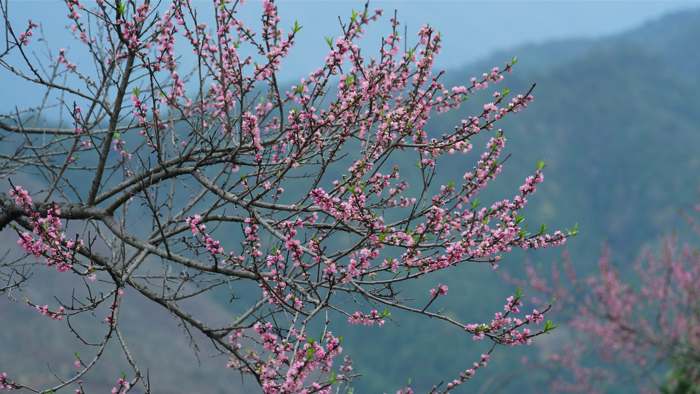Translated By Andrew Yang
Inside the gate this day last year, a face blushed with the blushing peach blooms.
Alas, that face is gone anywhither, yet the peach blooms smile on at spring breeze.
This quatrain is titled Written for the South Garden of the Capital, by Cui Hu (772-846) of the Tang dynasty (618-907). Its gentle sincerity and use of vernacular has made it popular over the centuries. And as a simile, “A face in peach blooms” has become household words.
Cui Hu, a scholar from Boling county, was born into a family of learning during the reign of Emperor Dezong (742-805). Being a simple man with talent and integrity, he buried himself in books all day and hardly had a social life.
One March, however, Cui Hu walks alone in the south of the city amid a brilliant spring scene, with willows flickering, birds chirping and a soothing breeze blowing under a warm sun. There in the neighbourhood, every household has peach trees planted at the front, their blossoms lavish and splendid. Soon, as the visitor passes one with an especial abundance of the flowers, a girl happens to be standing beside them beaming and nodding to him. The lass’s innocent smile and the gorgeous peach blooms beside her complement each other so well that they unforgettably tug at his heartstrings.
Now, a year on and the poet returns. When he strolls again past the same house, the sweet, charming lassie whom he bumped into a year ago is nowhere to be seen, and he likely feels it would be too much to enquire.
The seasonal change of nature is, of course, cyclical, but although all the scenery now remains the same for Cui Hu, that singular maiden face has all but vanished. Buddhist scriptures say, “Life being impermanent, all dharmas arise when causes and conditions harmonize and cease when they disperse. There is no eternal, unchanging intrinsic nature. Being without self-nature means being empty.” The journey of a human life, like traces of eagle claws in snow, is ethereal and evanescent. Today, peach blooms stay vibrant but the young woman being tenderly missed is absent. Apart from nursing pleasant memories and an aching realization that good times do not last, what else could one do?
While no one knows where the radiant miss is, the dazzling flowering peach trees exude the same kind of glowing smile in warm spring breeze as they did last year. The poem uses a human face and peach blossoms as a contrast in linking today and this day yesteryear against the same backdrop of a robust spring setting, conveying the poet’s delicate sentiments over someone he has had barely an encounter with.
During the Song dynasty (960-1279), the Chan master Furong Daokai (1043-1118), revered as eighth patriarch of Caodong Sect, wrote another quatrain on the subject of Chan, ending with the same line,
No dharma ever exists, as all dharmas are a void. One quip, ‘tis no enlightenment, please.
Some say word from Shaolin may soon end, and yet peach blooms smile on at spring breeze.
The master means to say that since the existence of all things in the world is fleeting and illusory, where is that one real, unchanging object which should help us make Chan queries towards enlightenment?
Some people, suggest the next two lines, fear that the spiritual teachings by Bodhidharma, first patriarch of Chan Buddhism, transmitted at Shaolin temple will be lost, but one should note that since truth is eternal and immortal, words or language would break it and an active, non-true mind would annihilate it, anyway. How, then, could there be any gain or loss with true-mind-oriented cultivation?
An enlightened Chan practitioner is one at peace with themselves, for whom when or where, one may ask, do peach blossoms not ever keep smiling at a fresh springtime zephyr?

